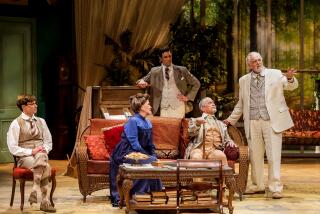Richard Eder : BERNARD SHAW COLLECTED LETTERS 1911-1925, edited by Dan H. Laurence (Viking: $45; 989 pp.)
- Share via
There was no silence in George Bernard Shaw. This exuberant prodigy who was so deeply devoted to common sense that he knew it could only ravish when expressed by extravagant paradox and extremity, was profoundly musical, and his music criticism was only one of a number of things he did better than anyone else. He had every note and played it. The only thing he didn’t play was the rests.
Fifty of the 578 letters in this third volume of a projected four-volume collection, are addressed to Shaw’s grand opera buffa of a passion: the actress Mrs. Patrick Campbell. They are a dazzlement of some self-concealment and a great deal more self-revelation--Shaw was thunderstruck though not dumbfounded, of course, when she published them--but it would have been nice to have one of her lines as well.
“When you were quite a little boy,” she wrote, “someone should have said ‘Hush’ just once.”
Shaw, according to Dan H. Laurence, editor of the collection, wrote several thousand letters a year for most of his 94-year life; all this apart from plays, criticism, prefaces, pamphlets and journalistic essays. The volume of the writing is clearly related to its largeness of spirit, as Laurence points out. The most extraordinary thing about the man was his faith in discourse as a way of attacking primeval night.
It is hardly fashionable anymore to say of him that his wit and his continual brandishing of social remedies amount to a shunning of human cavernosity He saw it, all right, but he thought it was to be roared at, played with, cajoled. Reading these letters, one could almost imagine Beckett as his Anglo-Irish nephew; the torrent of words and the torrent of silence both betray the same family malady.
Laurence has chosen letters to reflect just about every imaginable aspect of Shaw’s interests, entanglements and humors. Because of the time covered by this volume--1911 to 1925--the central portion is dominated by World War I. Shaw’s rage over the stupidity of the conflict stimulates him to some of his most trenchant political writing; later, the damage and the loss of his friends’ sons one by one introduce a blacker note. But there was plenty of wit in the blackness.
He antagonized many people and frightened his own colleagues at the supposedly fearless New Statesman by his ridicule of the shortsightedness of Britain’s leaders and the fatuousness of war propaganda. In the wave of indignation over German atrocities, he ironically suggested the only really effective atrocity. You shoot all women under 50. This effectively ensures that the country will be able to conduct no future wars, except by bringing in foreign wives; a step that clearly would work to dilute nationalism.
At the same time, he believed that, once begun, the only solution to the war was to win it; a German victory being worse. This led him to reject those Irish nationalists who counseled neutralism or assistance to the Germans. He corresponded with them with the utmost sympathy, but argued for reform and wartime cooperation with Britain.
“A cooperative dairy leaves you cold; a romantic expedition to Berlin by a knight errant who should have gone to offer France and Belgium the last drop of our blood delights you,” he wrote to Mabel Fitzgerald. The knight errant was Roger Casement, whom the British later hanged as a spy. “I prefer the cooperative dairy and the knight errant who transfixes the giant instead of the distressed damsel.”
There was a vein of prudence in him, and some people, including Ezra Pound, called him cowardly. But it was, in fact, the clearest kind of moral courage. He would not be stampeded nor--except for shock value--call for blood for the sake of consistency.
Certainly, he never hesitated to tell disagreeable truths even to those closest to him; although he told them most bewitchingly. He wrote a young singer friend that she would do better singing Annie Laurie on the streets than taking endless voice lessons; but there was a point: It is performance that is the real instruction. He wrote Mrs. Campbell that her ladylike version of Eliza was ruining his Pygmalion; but clearly he was right. He wrote the widow of Scott, the ill-fated explorer, pointing out the justice of a book that partly criticized him. Her friends found this scandalously impertinent; in fact, it must be the kindest and most healing letter anyone has ever written to the victim-survivor of a Great Legend.
Shaw would insist on every penny he could get for his plays; yet when a producer found himself on the point of bankruptcy, he wrote the man’s lawyers, postponing his claims--amounting to today’s equivalent of perhaps $100,000--indefinitely. When a nun asked him to buy a 10-pound raffle ticket, he objected that giving makes enemies. “Perhaps that is why God refused to give Jesus Christ anything, and made him buy what he wanted with his blood,” Shaw wrote, but sent a check plus six pennyworth of stamps for the bank fee.
He would instruct anybody about anything: on how to be a painter, on the civilizing use of a university education (almost as good as joining the navy), on how to rehearse a play. His letters to actors reflect his extraordinary insight into what makes a great performance, and, like many other things he wrote, are as valid today as they were then.
Sometimes the wit and the good humor may seem olympian. But Shaw kept it up even when hard-pressed. There is an extraordinary series of letters to an eccentric would-be biographer who insisted that Shaw’s mother was a villain. Shaw argues, jokes and turns alternately angry and compassionate. What he does not do is give up on his correspondent. Perhaps that, more than anything else, is the quality that keeps his intelligence, his enthusiasm and his intransigent paradoxes so largely relevant to us still.
Laurence’s editing is a major work. When the series is complete, there will be about 2,500 letters chosen out of tens of thousands surviving. The selection might be different but could hardly be bettered. Sometimes I could have used, in the notes preceding each letter, some additional bit of information about the recipient or the circumstances of writing. And an English reviewer notes the oddity that Laurence, prefacing one letter in which Shaw writes of a wearying day that featured two weddings and his sister’s death, writes: “The editor of these letters, by an intriguing coincidence, was born early the following morning.”
It is an oddity; and a beguiling one. After years of gathering and editing Shaw’s words, Laurence has become a figure in his life. So--after only a few days’ reading--do we.
More to Read
Sign up for our Book Club newsletter
Get the latest news, events and more from the Los Angeles Times Book Club, and help us get L.A. reading and talking.
You may occasionally receive promotional content from the Los Angeles Times.









